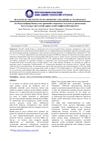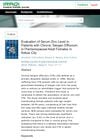 February 2024 in “Journal of Pakistan Medical Association”
February 2024 in “Journal of Pakistan Medical Association” Low zinc levels in hair and serum are linked to chronic hair loss.
 January 2024 in “Biological trace element research”
January 2024 in “Biological trace element research” Isotretinoin affects trace element levels and requires monitoring of liver and kidney functions.
 January 2024 in “The Egyptian Journal of Hospital Medicine (Print)”
January 2024 in “The Egyptian Journal of Hospital Medicine (Print)” Zinc levels are not directly linked to pattern hair loss.
[object Object]  January 2024 in “International journal of chemical research and development (Print)”
January 2024 in “International journal of chemical research and development (Print)” Low levels of vitamin B12, iron, ferritin, and zinc are linked to hair loss in Iraqi women.
 November 2023 in “Cureus”
November 2023 in “Cureus” Most people in Jazan know about vitamin D, zinc, and ferritin's link to hair loss but don't practice enough preventive measures.
 November 2023 in “Biology”
November 2023 in “Biology” Lower hair copper and copper-to-zinc ratio are linked to more severe coronary artery disease.
 June 2023 in “Italian journal of dermatology and venereology”
June 2023 in “Italian journal of dermatology and venereology” The oral supplement improved hair loss in patients with telogen effluvium.
 April 2023 in “Acta Poloniae Pharmaceutica”
April 2023 in “Acta Poloniae Pharmaceutica” Herbal extract shampoo increased certain minerals in hair and improved hair growth and scalp health.
 March 2023 in “World Journal of Biology Pharmacy and Health Sciences”
March 2023 in “World Journal of Biology Pharmacy and Health Sciences” Low levels of zinc and ferritin may be linked to the severity of alopecia areata in Iraqi patients.
 February 2023 in “Global journal of health sciences and research”
February 2023 in “Global journal of health sciences and research” Zinc levels are not significantly linked to the presence or severity of alopecia areata.
 February 2023 in “Benha Journal of Applied Sciences”
February 2023 in “Benha Journal of Applied Sciences” People with Telogen Effluvium have similar zinc levels in their blood as healthy individuals.
 January 2023 in “Theranostics”
January 2023 in “Theranostics” A patch with curcumin-zinc can improve hair growth and health by delivering beneficial particles to the skin, increasing hair follicles, and reversing effects of a hair loss hormone.
 January 2023 in “Postepy Dermatologii I Alergologii”
January 2023 in “Postepy Dermatologii I Alergologii” Zinc is important for health and its supplementation may help treat various conditions.
[object Object]  December 2022 in “Himi, himijn tehnologijn hùrèèlèngijn èrdèm šinžilgèènij bùtèèl”
December 2022 in “Himi, himijn tehnologijn hùrèèlèngijn èrdèm šinžilgèènij bùtèèl” Hair products with copper and zinc enriched yeast made hair thicker and denser.
 August 2022 in “International Journal of Health Sciences (IJHS)”
August 2022 in “International Journal of Health Sciences (IJHS)” Low levels of zinc, ferritin, and vitamin B12 are linked to severe hair loss in pregnant women during their last two trimesters.
 July 2022 in “Dermatology Reports”
July 2022 in “Dermatology Reports” Low zinc levels might be linked to worse outcomes in various skin disorders.
 July 2022 in “Al-Mağallaẗ al-ʻirāqiyyaẗ li-l-ṣaydalaẗ”
July 2022 in “Al-Mağallaẗ al-ʻirāqiyyaẗ li-l-ṣaydalaẗ” People with Alopecia Areata often have lower zinc levels, and more hair loss is linked to even lower zinc levels.
 January 2022 in “United Research Forum eBooks”
January 2022 in “United Research Forum eBooks” Picky eating in children is linked to lower zinc levels and various nutritional deficiencies.
 February 2021 in “Austin journal of nutrition & metabolism”
February 2021 in “Austin journal of nutrition & metabolism” Appropriate zinc levels may help prevent hair loss in university students.
February 2021 in “INTERNATIONAL JOURNAL OF SCIENTIFIC RESEARCH” Low zinc and copper levels may indicate Telogen Effluvium.
 January 2021 in “Middle East journal of applied sciences”
January 2021 in “Middle East journal of applied sciences” Zinc is essential for plant growth and human health, but many soils lack enough zinc, affecting crops and potentially leading to health problems.
 September 2020 in “Benha Journal of Applied Sciences”
September 2020 in “Benha Journal of Applied Sciences” Patients with Alopecia Areata have lower levels of zinc and biotin than healthy individuals.
 January 2020 in “Journal of Clinical Biochemistry and Nutrition”
January 2020 in “Journal of Clinical Biochemistry and Nutrition” Low zinc levels in chronic liver disease patients are linked to more severe symptoms like taste issues and skin problems, and zinc supplements might help.
January 2019 in “Türkiye klinikleri dermatoloji dergisi” Low levels of iron, ferritin, zinc, and folic acid may contribute to hair loss in women.
The levels of zinc, vitamin D, ferritin, and selenium are different in people with androgenic alopecia compared to a control group.
 September 2018 in “International Journal of Dermatology”
September 2018 in “International Journal of Dermatology” People with alopecia areata often have lower levels of zinc and vitamin D.
 April 2018 in “Assiut Veterinary Medical Journal/Maǧallaẗ Asyūṭ al-ṭibiyyaẗ al-baytariyyaẗ”
April 2018 in “Assiut Veterinary Medical Journal/Maǧallaẗ Asyūṭ al-ṭibiyyaẗ al-baytariyyaẗ” Zinc levels in body fluids can help diagnose zinc deficiency in lambs, with fecal zinc as an early indicator.
 March 2014 in “Journal of The American Academy of Dermatology”
March 2014 in “Journal of The American Academy of Dermatology” Vitamin D deficiency is common in temporary hair loss, and stress is often a suspected cause.
 January 2013 in “kerbala journal of pharmaceutical sciences”
January 2013 in “kerbala journal of pharmaceutical sciences” Low zinc levels are strongly linked to hair loss in adult premenopausal women.
Adding zinc to papaya extract speeds up wound healing.


























